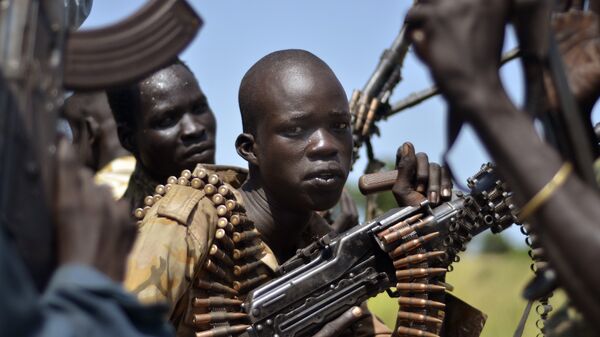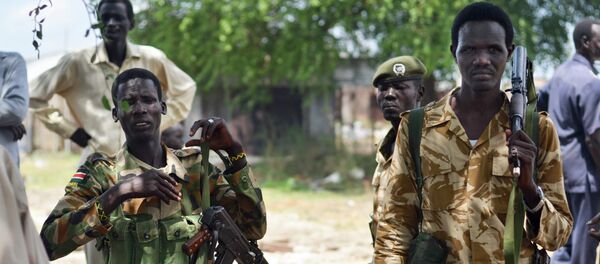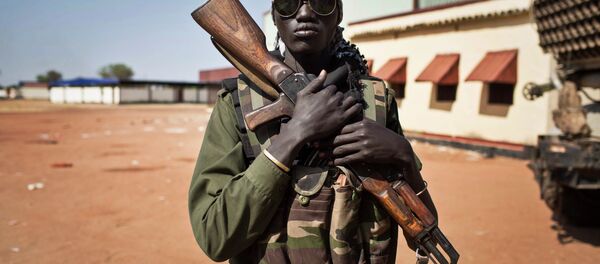As South Sudan draws near five years of independence, its people are face a crashing economy that is impacting the already fragile peace agreement and is having devastating effects causing ongoing fighting and displacement.
Listen to the voices of #SouthSudan, as the country turns 5: https://t.co/5k1EFaHfNJ @rxfogarty #DearWorldSouthSudan pic.twitter.com/ZxICT0TeGQ
— Oxfam International (@Oxfam) 7 July 2016
Most working South Sudanese are now poorer than they were nearly a decade ago, with many no longer able to afford enough food, water or other basic essentials.
1 in every 4 people in #SouthSudan are displaced, & we are gravely concerned, briefs @melissarfleming at @UNGeneva pic.twitter.com/ECZk7bmDKG
— UNHCRNews (@RefugeesMedia) 8 July 2016
Since the start of South Sudan's conflict in December 2013, more than 2.3 million people have been forced to flee their homes.
In the months prior, South Sudan's food security outlook was the best it had been in five years. But since conflict broke out, unprecedented levels of hunger have been continually surpassed, with the World Food Program, predicting this year's lean season (May — July) as the worst on record since the country gained its independence in 2011.
In an attempt to generate money, the Government of South Sudan has sold oil stocks.
Oxfam South Sudan Country Director Zlatko Gegic, who has just returned from Wau — which has seen much violence and people in need of urgent humanitarian aid — believes that the economic collapse is going to destroy the lives of future generations in South Sudan.
"It is not only oil futures that are being sold off. By auctioning off its main source of revenue, the government is selling off the future of its people. A crashing economy and rampant inflation are compounding the suffering millions of South Sudanese and condemning them to an even more uncertain future." Oxfam's Zlatko Gegic told Sputnik.
The level of #hunger in #SouthSudan today is the highest since the conflict began https://t.co/4x5NcNBKsL pic.twitter.com/m6AjJNXQ6l
— FAO in Emergencies (@FAOemergencies) July 3, 2016
Gegic also said that the violence is impacting the lives of the people on the ground with innocent civilians being affected by the horrendous violence and the desperate need for everything from food and shelter to basic healthcare.
"[They] left homes with nothing but clothes on their backs. As always, women, children and elderly are suffering the most," Gegic said.
'Stop violence against children'. Powerful messages of hope from people in South Sudan https://t.co/AtLCm4rTqo pic.twitter.com/sIVrmnkcAs
— Sacha de Wijs (@SdeWijs) July 1, 2016
The impact on the people is something that has also been highlighted by Amnesty International, who released a report detailing the psychological trauma that those now living in Sudan are facing.
Amnesty's report highlights the fact that many were forced to eat human flesh and disembowel dead bodies during the recent civil war, which alongside continual exposure to conflict and multiple large scale massacres has left a nation bereft of mental health support that they are in desperate need of.
A peace agreement was established in 2015, however it has been increasingly strained. The country has seen localized conflict in stable states and deadly clashes, the most recent being the killing of five soldiers on July 7 in the South Sudan capital of Juba.
5 KILLED in fresh fighting in Juba between soldiers loyal to South Sudan President Salva Kiir and Vice-President Riek Machar.
— Antony Nyongesa (@NyongesaAnthony) July 8, 2016
"[The] situation in South Sudan is very complex; we are talking about one of the biggest humanitarian crisis in the world. The economy in its current state will find it very hard to recover as long as stable peace is not in place and this humanitarian crisis will increase for quite some time to come, until we see positive improvements," Zlatko Gegic told Sputnik.
Gegic also said that the world should not lose or takes its focus away from South Sudan and he urged the international community to not turn its back on the country, which needs them more than ever now.
"I would like to deliver a message that Oxfam and other humanitarian actors in South Sudan are repeating. This is not a time to forget South Sudan there are massive needs in this country the scale of people suffering is bad. The world should not forget South Sudan; compared to five years ago, South Sudan has no reserves or international good will. The economy is in a bad state and over half of the population is in need of help, people are hungry not able to afford a meal and this is not a time for the world to forget us."




